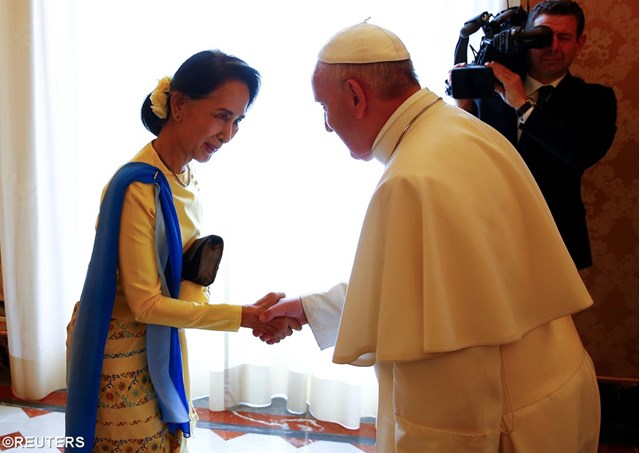
More Church leaders welcome Vatican-Myanmar diplomatic ties

Many Catholic Church leaders in Myanmar have welcomed the news of the Holy See and Myanmar agreeing to establish formal diplomatic relations. The Vatican announced the joint decision shortly after Pope Francis and Myanmar’s State Counselor Aung San Suu Kyi met in the Vatican May 4. This means the Pope will appoint an ambassador called the Apostolic Nuncio to Myanmar in exchange for an ambassador from the Southeast Asian nation. In countries with whom the Holy See does not have diplomatic ties, an Apostolic Delegate may be sent to act as a liaison with the Roman Catholic Church in that country, though not accredited to its government. The Apostolic Delegate to Myanmar is Archbishop Paul Tschang In-Nam, based in Thailand.
Father Maurice Nyunt Wai, executive secretary of the Catholic Bishops' Conference of Myanmar, said he looked forward to the country becoming part of the international community after being isolated for more than six decades under military dictatorship. "It is beneficial for interreligious dialogue and will help the peace process," Father Nyunt Wai told UCANEWS referring to ongoing conflict between ethnic groups and the Myanmar military in Kachin and northern Shan states. "It's a great opportunity for the nation," he said, adding the Pope and Suu Kyi should discuss the peace process throughout Myanmar and not focus solely on the Rohingya issue.
Bishop Alexander Pyone Cho of Pyay said the meeting was good news for the Catholic Church in Myanmar. "The Catholic Church will have more of voice in nation-building especially in the peace process and interfaith dialogue so it is really helpful not only for the church but also for other religions in the country," Bishop Pyone Cho told UCANEWS.
Sister Margaret Maung, president of the Catholic Religious Conference of Myanmar, said she was very proud when Suu Kyi met with Pope Francis. "We have many expectations that we can carry out now including building peace through interfaith dialogue because religious leaders have a very important part to play in ending conflicts across the country," Sister Maung told UCANEWS.
Pope Francis and Suu Kyi had met earlier on Oct. 28, 2013, when Myanmar’s opposition leader was in Rome to pick up an honorary citizenship she’d been awarded by the Italian capital 1994. Two years later, the Pope appointed the first-ever cardinal from Myanmar, Charles Bo, Archbishop of Yangon, in a clear sign of respect and affection for the country. Diplomatic ties between the Holy See and Myanmar will certainly boost the role of the Catholic Church in the southeast Asian nation where. Catholics are a tiny minority in the Buddhist majority country of 51 million people.
Cardinal Bo has been calling for safeguarding the rights of ethnic and religious minorities, and a greater role for leaders of the country’s various religions in the nation’s peace process. He recently convened an interfaith peace conference in Yangon where he urged religious leaders to promote peace and dialogue at grassroots levels.
Suu Kyi, the 1991 Nobel peace prize laureate, won international support for her fight for human rights and democracy but her government has been under fire for a months-long campaign of persecution against the Muslim Rohingya by the military which is still a key player in the country's politics.
Pope Francis first spoke out on the fate of the Rohingya in August 2015, during a session with youth in Rome. “Let’s think of those brothers of ours of the Rohingya,” he said. “They were chased from one country and from another and from another. When they arrived at a port or a beach, they gave them a bit of water or a bit to eat and were then chased out to the sea.” “This is a conflict that has not resolved, and this is war, this is called violence, this is called killing!” he said.
A month later, he brought the Rohingya issue up again in an interview with Portuguese radio. “Further away from Europe there is another phenomenon which hurt me deeply: the Rohingya, who are expelled from their country, get into boats and leave,” he said. “There is a lack of capacity for welcoming humanity.” Pope Francis remembered the Rohingya at the general audience of Feb. 18, this year. "They are our brothers and sisters. They have been suffering for years. They have been tortured and killed just because they want to keep their traditions and Muslim faith," the pontiff said.
Bishop Pyone Cho said Pope Francis' prayer for the Rohingya in February showed that he is a loving spiritual leader. "In my opinion, the pope used the term 'Rohingya' in his prayers because the international community use it but, for local people in Myanmar, it is very sensitive word because it means that they are citizens as opposed to illegal immigrants," Bishop Pyone Cho told UCANEWS. Father Nyunt Wai said, "We need to look with holistic view at Myanmar's challenges as the Rohingya crisis is not the only problem in Myanmar but also civil war, poverty, education and healthcare."
There are about 700,000 Catholics in Myanmar’s 16 dioceses. The Catholic Church in the country turned 500 years in 2011. But since political situation then was not conducive for a celebration, it was marked in 2015. (Source: UCAN)
| All the contents on this site are copyrighted ©. |


